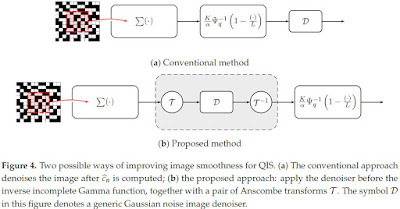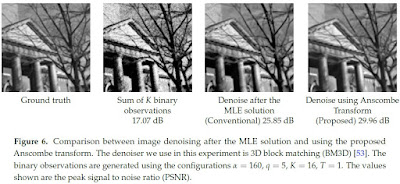Open-access Sensors journal publishes Purdue University paper "Images from Bits: Non-Iterative Image Reconstruction for Quanta Image Sensors" by Stanley H. Chan, Omar A. Elgendy, and Xiran Wang. From the abstract:
"Because of the stochastic nature of the photon arrivals, data acquired by QIS is a massive stream of random binary bits. The goal of image reconstruction is to recover the underlying image from these bits. In this paper, we present a non-iterative image reconstruction algorithm for QIS. Unlike existing reconstruction methods that formulate the problem from an optimization perspective, the new algorithm directly recovers the images through a pair of nonlinear transformations and an off-the-shelf image denoising algorithm. By skipping the usual optimization procedure, we achieve orders of magnitude improvement in speed and even better image reconstruction quality. We validate the new algorithm on synthetic datasets, as well as real videos collected by one-bit single-photon avalanche diode (SPAD) cameras."
Thanks to EF for the link!



This is a significant breakthrough in creating images from photon-counting image sensors. Be sure to check out Figs 10 and 11. They use SPAD images from both Dutton et al. in Edinburgh and Charbon et al. at Delft/EPFL. Quite impressive results.
ReplyDeleteThe results are impressive and I was not expecting the normal k=256 sums to look as poor as they did on fig 11. I also notice some of the shadow detail is lost using the new algorithm. Could it be that because the noise reduction takes place for each image first there some lower sparsity pixels are lost with a result similar to Nikons star eater noise reduction on stacked astro images?
ReplyDelete